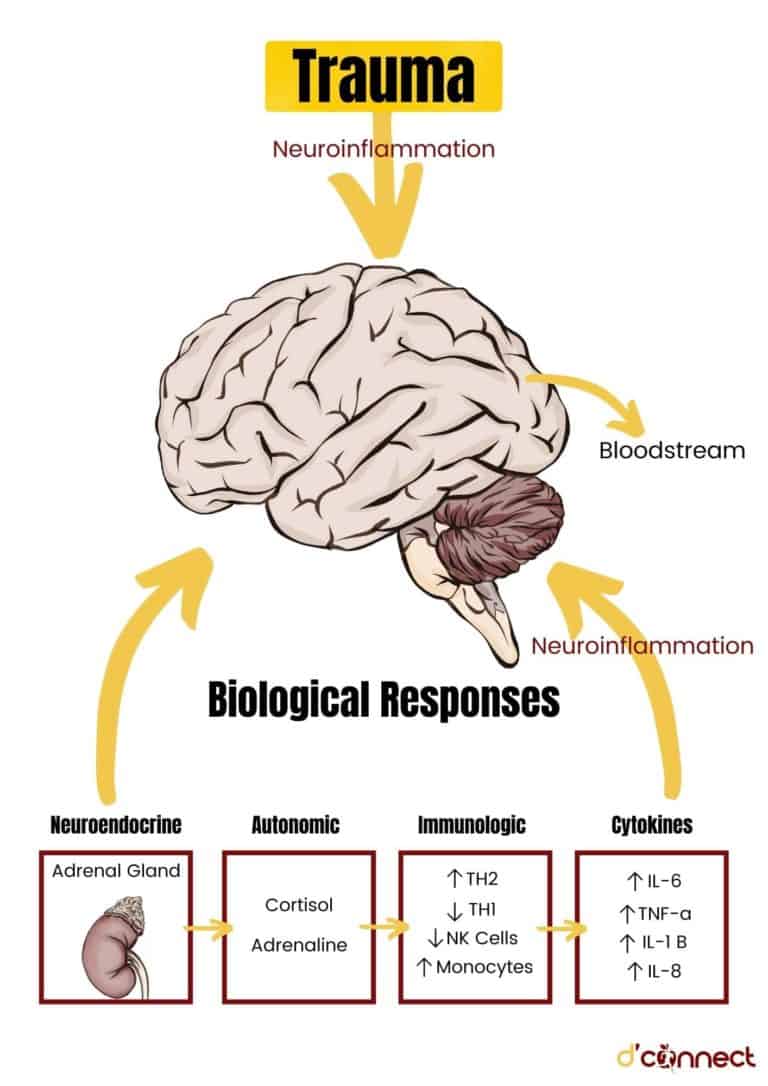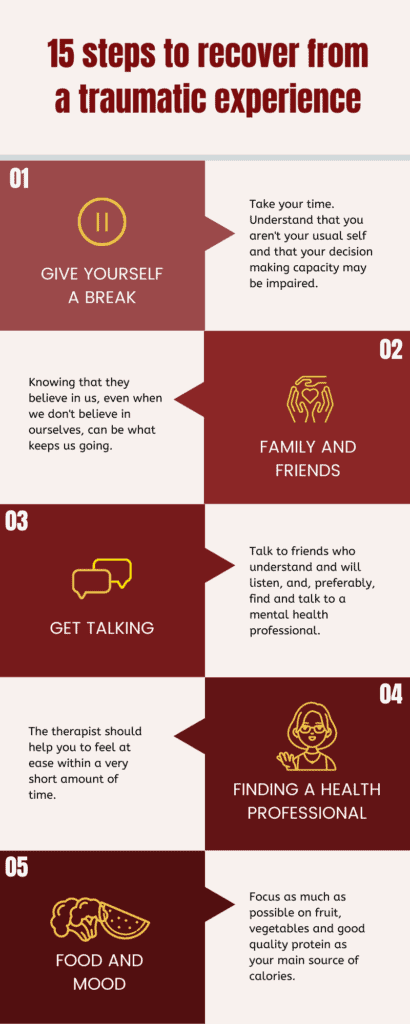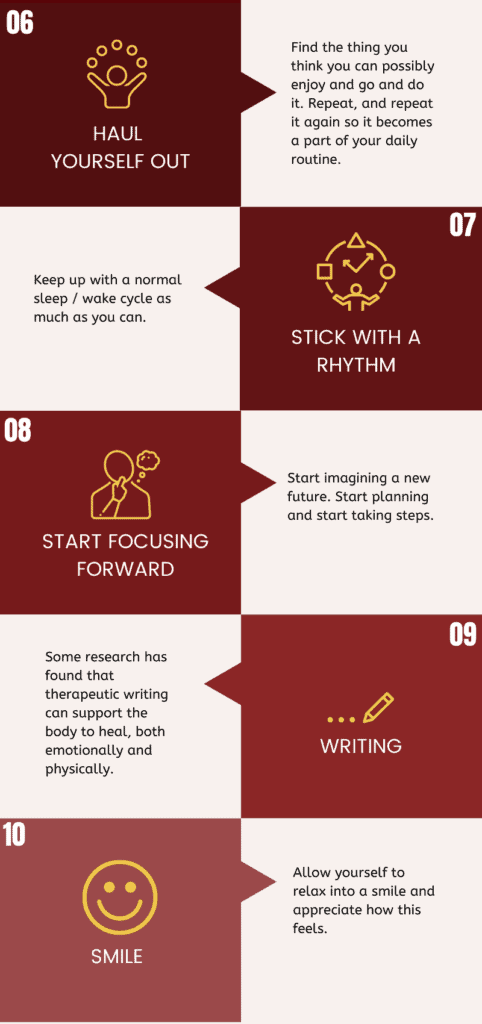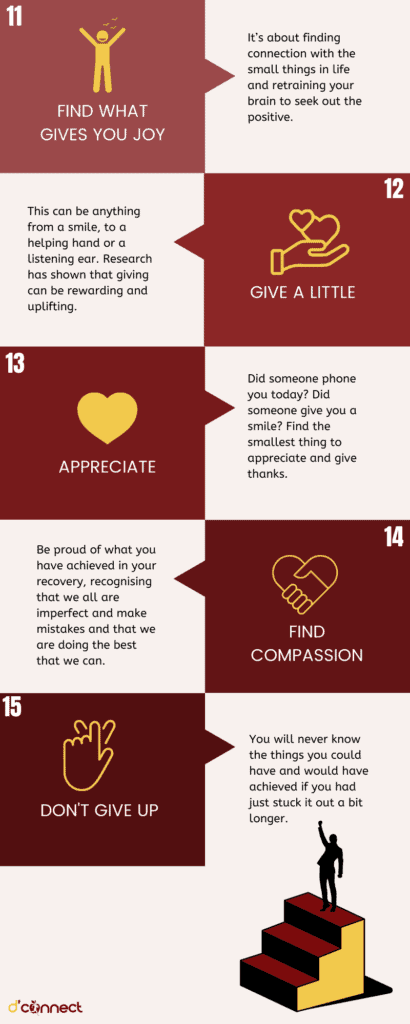
Helen Duyvestyn
Registered Nurse, Adv. Dip Nursing, Cert. Adv. Nursing, MHSc (Mental Health).

Molly Farrell
BSci majoring in Psychology, PGDp in Health Science
A journey of recovery from a traumatic event is never linear. Or easy. We can be struck down by physical or psychological trauma, or if we haven’t gotten over a particular traumatic event, we could be dealing later on with a post traumatic stress disorder.
Important to understand is that a traumatic event is not some kind of enigma. It can be broken down into stages, and like with anything in life, those stages can be overcome and conquered, so we can finally move on.
The 7 stages of trauma are:
- Shock or disbelief
- Denial
- Bargaining
- Anger and guilt
- Depression
- Acceptance
- Hope
Today is about recovering from a challenging life event which has had a significant impact on your life and how you can get back to enjoying life by using the techniques outlined below.
Emotional and Psychological Trauma
As described by the American Psychological Association, emotional trauma refers to negative or disruptive feelings that follow a disturbing experience, which have a negative influence on our attitudes and behaviour.[1]
We can take the event of a natural disaster for example, or the trauma which accompanies emotional or physical abuse. These experiences create emotional responses to the reality and memories of the event. The trauma we endure has the potential to change the way our brains operate and therefore the way we live our lives.[2]
Keeping this in mind, trauma has longitudinal components therefore the way humans process emotional events is particularly important and we must invite natural healing processes.
Knowing how trauma influences our emotions helps us make sense of the behavioural changes that can occur alongside overcoming trauma. Whether someone is experiencing the heartbreak of grief or the physical and mental pain of abuse, the sensitivity of our body and mind will change, and can make us act in a certain type of way.
Trauma tends to relinquish our sense of control, whether that be physical or emotional control.
With this in mind, successful healing needs to foster our sense of control over our thoughts and sense of self.[3]
What are 7 stages of trauma
The stages of overcoming trauma and grief are widely discussed in the field of psychology. To follow the founding work of Kuber-Ross in the 60’s, overcoming trauma and grief is now often methodised into 7 steps.[4]
1. Shock or disbelief
Enduring trauma shocks our system, and it can take time for our mind and body to comprehend our experiences. This stage of shock can be described by the numbness and lack of comprehension we may experience.
2. Denial
Denial is tightly bound with our sense of disbelief. As we start to acknowledge our past or present traumas we may challenge our reality and attempt to create our own narrative in order to protect our emotions. With denial, we may ignore what has happened or pretend everything is perfectly fine.
3. Bargaining
The reality is, we cannot change what has happened. Unfortunately, for many of us, this results with a stage of “what ifs”. This is what psychologists call the bargaining stage where we attempt to create a new reality by indulging in “if only I…” thinking.
It is as if we are trying to bargain fate to do it again differently in the hope of a different outcome.
4. Anger and guilt
The bargaining process tends to lead to feelings of guilt or anger. As we question the fairness of our experience, we may take on personal blame, or express our disappointment with the world or actions of others.
Again, it is healthy to express our emotions as we start to process our grief. However, it is very important to be aware of how we treat ourselves over this stage.
Denial is tightly bound with our sense of disbelief
5. Depression
Overcoming the shock and anger associated with a traumatic event can lead to feelings of depression. During this stage, individuals are confronted with their emotions, and it is common to see changes in behaviour. Those struggling may isolate or turn to stimulants for comfort.
RELATED — Introduction to: Depression
Embracing our emotions during this stage is crucial. We need to feel the need to heal, while also reassuring our sense of safety with nurturing and support.
6. Acceptance
Embracing our emotions is part of accepting the grief or trauma we have endured. Individuals may feel they have to relive their experience to fully comprehend what has happened. Acceptance can take time, and this road may be turbulent.
7. Hope
As we accept the pain we are experiencing, light at the end of the tunnel starts to transpire. We must remember that overcoming emotional stress is not a linear process and that some days we may feel back at day one.
The sure thing is, time heals all wounds and there is hope we can get back to our new happiness.
Effects of Psychological Trauma
Trauma and stress from a psychological event is processed in the same way the body responds to a physical stressor – it prepares the body for fight or flight. In the short term, these hormones and changes in blood flow can be helpful as it promotes immediate action.
For example, in response to a car pulling out in front of us, our body responds by releasing immediate chemicals (hormones and neurotransmitters) which promotes a fast moving response – causing us to move our foot immediately on to the brake pedal.
In the case of psychological stress, however, fighting or fleeing may not be an appropriate action. Having an issue with our boss at work or having relationship problems with our partner may not be the time to engage in fighting or fleeing – yet the hormone release is the same.
This can leave us feeling particularly uncomfortable and create the feeling of stress with no obvious outlet.
Different types of emotional trauma
Emotional trauma can be caused by a number of different events and can include the topics we often associate with trauma such as:
- Physical abuse
- Psychological abuse
- Post traumatic stress disorder
These forms of trauma can be both short and long term, and in most cases, events occurring across a longer period of time are often the most challenging to overcome, requiring more effort to address.
If we do not recover from a traumatic event, we may be dealing later on with Post Traumatic Stress Disorder
PTSD can last months or years and can be identified when an individual is triggered by any stimuli that takes them back to a traumatic event often accompanied by intrusive flashbacks or nightmares. It is strongly recommended to seek help from a professional to assist with the healing of this disorder.
On the other hand, trauma may derive from a single incident such as:
- A significantly humiliating experience
- Breakup or divorce in a significant relationship
- Loss of significant job or position
- Sudden, unexpected death of a loved one
- Diagnosis of a life-threatening or disabling condition
Effects on the brain
Traumatic events cause increased levels of stress hormones, increased blood flow to different regions of the brain, changes to the size of different parts of the brain and increased sensitivity to stress.

Stress and trauma are associated with an increase in stress hormones (cortisol, epinephrine and norepinephrine) and changes the blood flow in regions of the brain.
RELATED — Understanding Stress: The Silent Killer
Stress or trauma that is continuous can cause changes in the size of areas of the brain such as the amygdala and can result in increased reactivity to stress in the future.[2]
In the thinking of what fires together, wires together, repeated stress enhances neural pathways ensuring they are ready to fire together again at a moment’s notice.
This can cause us to be especially sensitive, reactive and ready to act at a moment’s notice with only a minor stimulation.
An increased startle reflex is an example of this response, as evidenced in PTSD (post traumatic stress syndrome).
It's time to heal - where to start
If you have ever suffered from depression, significant stress or even from a low period in your life, such as a relationship break-up or loss of a job, coming out of it can feel like you are emerging from a mental fog.
It can feel strangely unfamiliar finding your feet or indeed finding a new way in the world. Chances are you don’t quite feel the same person that you used to be.
Below are steps to help us recover and get back on the horse.
15 Steps on how to recover from a traumatic experience
We must remember that every journey of healing can look different and what works for someone may not work best for another. However, on a promising note, there are key actions we can take to help ourselves navigate through.
1. Give yourself a break
Research has now confirmed what we already knew – our thinking is not very clear when we are depressed or suffering chronic stress.[2] Mental confusion, difficulty making simple decisions and forgetting things are a result of changes in brain blood flow.
This means that you should be careful when making any life changing decisions. Take your time. Understand that you aren’t your usual self and that your decision making capacity may be impaired.
2. Family and Friends
During the low period, support from loved ones is an important aspect of recovery.[5] Knowing that they believe in us, even when we don’t believe in ourselves, can be what keeps us going.
You may have avoided company when you were at your lowest, but I encourage you – even if you don’t feel like it – to seek and accept support from loved ones. Sometimes just being in other people’s company is enough.
3. Get Talking
If you have been talking while you were really struggling, keep it up. Talk to friends who understand and will listen, and, preferably, find and talk to a mental health professional.
Although it’s wonderful to talk to your brother, sister, uncle or aunt about how you are feeling, a professional is unbiased, without judgement and is trained in helping you recover.
Focus on where you want to be in the future rather than focusing on how bad you feel in the present
4. Finding a health professional
The most important feature of talking therapy is the rapport you have with the therapist. It can be nerve wracking seeking professional help the first time, but the therapist should help you to feel at ease within a very short amount of time.
If you don’t feel like you clicked, consider finding another therapist. Every therapist’s style is different and you need to find the one that is right for you.
RELATED — Mental Health: The more we talk about it, the easier it gets
5. Food and Mood
Understand that the food you might be seeking comfort in, will also influence your mood. Processed food, junk food, high sugar food has been shown to make you more irritable, more likely to contribute to anxiety and more likely to keep you depressed.[6,7] Focus as much as possible on fruit, vegetables and good quality protein as your main source of calories.
RELATED — Diet and the Brain: Our brain on sugar

6. Haul yourself out
Haul yourself out of the bed and out of the house, preferably before 9 am. Go for a walk. Expose yourself to the morning sun. Get to the gym. Get in the garden. Find the thing you think you can possibly enjoy and go and do it.
Repeat, and repeat it again so it becomes a part of your daily routine. The more you move and integrate yourself back into normal, the more you will support your healing. Exercise has been shown to be as effective as an antidepressant– so movement is an essential part of recovery.[8]
RELATED — Workout Motivation: Why we lose it and how to get it back
7. Stick with a rhythm
Keep up with a normal sleep / wake cycle as much as you can. Poor sleep cycle and disrupted circadian rhythm is related to poorer mental health.[9]
Get yourself into bed by 10. Use a relaxation technique, sleep stories from an app, deep belly breathing or yoga nidra to support drifting off to slumberland. Get out of bed before 9 am and get outside (see above).
RELATED — What is Meditation and How to Start
8. Start focusing forward
What do you want? Really? In your wildest dreams? Who do you want to be? Find that image. Find that new being. Connect with it. Start imagining a new future.
You know the saying, aim for the moon and if you fall you will be among the stars. Find the first easiest step and gently take it. Want that new job? Start planning and start taking steps. Using mental visualisation that you are living a good life helps you prepare for doing just that.[10]
RELATED — The Best Possible Self – Mental Health Exercise
9. Writing
Journaling or writing can be a very positive way of processing difficult feelings. Some research has found that therapeutic writing can support the body to heal, both emotionally and physically.[11]
Writing about how you are feeling, what you are experiencing and also writing about your recovery may all be helpful.
10. Smile
Try smiling. There may be moments when you notice a little joy or find something humorous. Allow yourself to relax into a smile and appreciate how this feels.
RELATED — The power of a smile: How to improve your health and decrease stress
If possible, make an effort to smile at others. The positive feedback (a smile in return) will light up places in your brain which may have been feeling pretty dull for a while.
Smiling even when you don’t feel like it is not meant to hide your feelings, rather to connect with the feeling that a smile can create. Research has shown that even a ‘fake’ smile can actually improve your mood.[10]

11. Find what gives you joy
Although joy for you might include drinking cocktails on a beach, don’t forget that “wherever you go, there you are”. In other words, taking yourself to the beach to drink cocktails is all very well, but there has to be a change in your thinking that goes along with it.
Find what really gives you true joy
This is likely to be something little. The setting sun, the sound of rain on the roof, the feeling of sand between your toes. It’s about finding connection with the small things in life and retraining your brain to seek out the positive.
12. Give a little
This can be anything from a smile, to a helping hand or a listening ear. Research has shown that giving can be rewarding and uplifting.[11]
If you are one of those people that tends to over-give and leave very little for you, perhaps it’s time to give a little something to yourself.
13. Appreciate
This is about finding gratitude and appreciation in your life. This is a tough one when we are struggling, so you may need to dig deep and think hard about this one. Did someone phone you today? Did someone give you a smile? Did you notice a lovely flower in bloom?
Find the smallest thing to appreciate and give thanks.
14. Find Compassion
The kindest, most healing thing that you can do is to treat yourself with compassion and remind yourself that ‘’this too shall pass”. As Kirstin Neff suggests “With self-compassion, we give ourselves the same kindness and care we’d give to a good friend.”[12]
This means to be proud of what you have achieved in your recovery, recognising that we all are imperfect and make mistakes and that we are doing the best that we can.
15. Don’t give up
Nothing will ever be resolved if you give up. If you give up, you will never know what magic might have happened. You will never know the things you could have and would have achieved if you had just stuck it out a bit longer.

Life can be incredibly challenging at times. You, the Dalai Lama, Buddha and Jesus, all know about suffering. It’s part of being human.
What are the 10 signs that you are healing
Once you are on the road to recovery you will notice signs as an improvement and that you are on your way back to your old self. Or perhaps a better, brighter new version of yourself.
Resilience can be defined as achieving a positive outcome in the face of adversity and this is an important part of recovery.[13]
1. Noticing the moments
It may happen only in moments, but you will notice when you feel a little normal. This is a sign that “you” are still here and are slowly returning. In between everything else going on in your head, notice these normal moments.
2. Sleep
Sleep quality will improve, with less time taken to get to sleep and less time awake during the night.
3. Energy
You’ll start to feel energy to do things again and feel less fatigued during the day.
4. Appetite
Appetite is often off when we are stressed due to the physiological changes that happen. A return to having an appetite is a good sign that things are improving.
RELATED — The Healthy Plate Model – Essentials of Healthy Eating
5. Friends and family
You want to be with friends and family again and focus on making and maintaining friendships which may have drifted off.
6. Future thinking
You naturally start to think about your future and what you want to achieve.
7. Concentration
You notice that your concentration is beginning to improve. You can focus on reading a book or watching a film without being bothered by intrusive thoughts.
8. Thinking outside yourself
When you are deeply distressed, the mind is very self focused.
You will notice that you are able to be more aware of others around you. Involve yourself more in their life situation and stories and contribute more to their needs.
9. Motivation
Motivation will improve. You may decide to use this in a positive way – can you help someone else with the experience you have been through? Are there things you want to change in your life to prevent this from occurring again?
10. Meaning and purpose
One of the signs of recovery is being able to find meaning and purpose, not only in your life, but perhaps also in the event that caused the distress in the first place.
How long does it take to heal from a traumatic experience or event?
Healing from a traumatic event can take months to years, depending on the type of trauma, the support taken to heal and the recovery path the person chooses to take.
It takes time to calm the brain, refocus old or unhelpful thinking patterns and rewire the circuits. There will be times when suddenly after a period of doing well, we might slip back into negative thinking or be once again ‘stuck’ on the event.
This is normal and part of the healing process.
Recovery isn’t always linear
So be kind to yourself, keep focused on the end goal, enlist the help you need and take another step forward.
Related Questions
1. How do I stop thinking about a traumatic event?
One of the biggest challenges of overcoming a traumatic event is coping with the intrusive thoughts which may follow.
As our minds deal with the emotional pain associated with trauma, we may experience flashbacks of our underlying memories. Or in other cases, our minds may spend an undesirable amount of time ruminating on our response or behaviour in these moments.
Rumination or having to relive negative memories due can be very interruptive towards our healing process and can exacerbate our levels of distress. Ideally, we want to minimise the retrieval of these memories and reduce their disruptive power from our day to day.
Here are a few ways we can limit rumination and elevate our sense of clarity:
- Bring awareness to your thought patterns when you are recalling a traumatic experience or replaying a scene in your head. Remember, we cannot change the past no matter how much we think about it so intercept these thoughts with something else.
The more we do this, the better we get at rewiring our thought loops.[14]
- Schedule in time for emotional processing. If you are noticing a repetition of intrusive thinking, schedule in a time throughout the day to address these emotions and thoughts. In doing so, we are training our brain to ignore these negative thoughts with the relief that we will process them at a more appropriate hour, with a time limit applied too.[14]
- Practice mindfulness. Mindfulness brings your mind and body into the present. Introducing mindfulness into your daily routine supports our brain’s practice of being present and allowing thoughts to flow throughout the day without having to channel or indulge in every thought.[14]
2. Do traumatic memories go away after some time?
It is important for us to remember that healing is not a linear process and can look differently for everyone. However, the time of healing is often influenced by the severity and duration of the event.
Trauma symptoms can last from days to months, but gradually pass over time. For others, it may not be so simple and for those experiencing prolonged effects of their trauma may be experiencing Post Traumatic Stress Disorder, in which seeking professional help is strongly encouraged.[15]
3. What are some of the triggers that can remind us of a traumatic event?
Humans can relive their trauma over and over again as our memories are triggered throughout our day to day.
Emotional triggers can be any form of sensory stimuli that takes us back to an intense negative emotion.[15]
Depending on the trauma endured, sounds, images, smells or witnessing certain actions can all actuate unpleasant recollections and interfere with our ability to stay present in the moment and our fight or flight response is activated.
Let us know in the comments below if we covered everything in this post and if there is something else to add. Also, share your experience, no matter how unpleasant. Your experience can make a difference to another person.
Helen is a registered nurse who holds a Masters in Health Science (Mental Health) and is a trained Life Coach. She has worked for fifteen years in acute psychiatry as a psychiatric nurse and for over two years in a holistic health clinic in Central Auckland, specialising in physical health and well-being. She has trained with ACNEM (Australasian College of Nutritional and Environmental Medicine) and is a member of AIMA (Australasian Integrative Medicine Association).
Helen is passionate about empowering others through education to reach their mental health and well-being potential. Read more about Helen and her work at OneLife.
With extensive experience as a mental health support worker, Molly knows first hand the impact our mind can have on our physical, emotional and social wellbeing. She has completed a Bachelor’s of Science, majoring in Psychology, and a postgraduate diploma in Health Science, which gives her an opportunity to combine theoretical knowledge with practice.
Molly’s goal and focus is to provide others with education and awareness on how we can improve our mental wellness and of those around us.
References
(1) American Psychological Association. (202). APA Dictionary of Psychology, Trauma. https://dictionary.apa.org/trauma
(2) Bremner J. D. (2006). Traumatic stress: effects on the brain. Dialogues in clinical neuroscience, 8(4), 445–461. https://doi.org/10.31887/DCNS.2006.8.4/jbremner
(3) Kircanski, K., Joormann, J., & Gotlib, I. H. (2012). Cognitive Aspects of Depression. Wiley interdisciplinary reviews. Cognitive science, 3(3), 301–313. https://www.ncbi.nlm.nih.gov/pmc/articles/PMC3518852/
(4) Dryden- Edwards, R. (2021). Grief and Mourning. Medicine Net. https://www.medicinenet.com/loss_grief_and_bereavement/article.htm
(5) McEwen, B.S., Gray, J.D & Nasca C. “Recognizing Resilience: Learning from the Effects of Stress on the Brain.” Neurobiology of stress vol. 1 (2015). https://www.sciencedirect.com/science/article/pii/S2352289514000022
(6) “Food and mood: how do diet and nutrition affect mental wellbeing?.” 29 Jun. 2020, https://www.bmj.com/content/369/bmj.m2382. Accessed 3 Sept. 2021.
(7) Li, Y., Lv, M.R., Wei, Y.J., Sun, L, Zhang, J.X., Zhang, H.G & Li, B.(2017). “Dietary patterns and depression risk: A meta-analysis.” Psychiatry research vol. 253 (2017): 373-382. https://www.sciencedirect.com/science/article/abs/pii/S0165178117301981?via%3Dihub
(8) Blumenthal, J., Smith, P.J & Hoffman, B.M. (2012).“Is Exercise a Viable Treatment for Depression?.” ACSM’s health & fitness journal, 16(4), 14-21. 10.1249/01.FIT.0000416000.09526.eb
(9) Scott, J., Bryne, E., Medland, S & Hickie, I. (2020). “Short communication: Self-reported sleep-wake disturbances preceding onset of full-threshold mood and/or psychotic syndromes in community residing adolescents and young adults.” Journal of affective disorders, 277, 592-595. doi:10.1016/j.jad.2020.08.083
(10) Sheldon, K. M., & Lyubomirsky, S. (2006). How to increase and sustain positive emotion: The effects of expressing gratitude and visualizing best possible selves. Journal of Positive Psychology, 1(2), 73-82.
http://sonjalyubomirsky.com/wp-content/themes/sonjalyubomirsky/papers/SL2006a.pdf
(11) Neuhoff, C. C., & Schaefer, C. (2002). Effects of laughing, smiling, and howling on mood. Psychological reports, 91(3 Pt 2), 1079–1080. https://doi.org/10.2466/pr0.2002.91.3f.1079
(12) Cangialosi, K.(2002). “Healing Through the Written Word.” The Permanente Journal, 6(3), 68–70.
https://www.ncbi.nlm.nih.gov/pmc/articles/PMC6220635/
(13) Park, S. Q., Kahnt, T., Dogan, A., Strang, S., Fehr, E., & Tobler, P. N. (2017). A neural link between generosity and happiness. Nature communications, 8, 15964. https://doi.org/10.1038/ncomms15964
(14) Psychology today. (2016). 5 Ways to Stop Reliving Painful Memories. Psychology Today. https://www.psychologytoday.com/us/blog/what-mentally-strong-people-dont-do/201602/5-ways-stop-reliving-painful-memories
(15) Ridgeview Hospital. (2021). How to Identify Emotional Triggers in Three Steps. Ridgeview Hospital. https://ridgeviewhospital.net/how-to-identify-emotional-triggers-in-3-steps/






